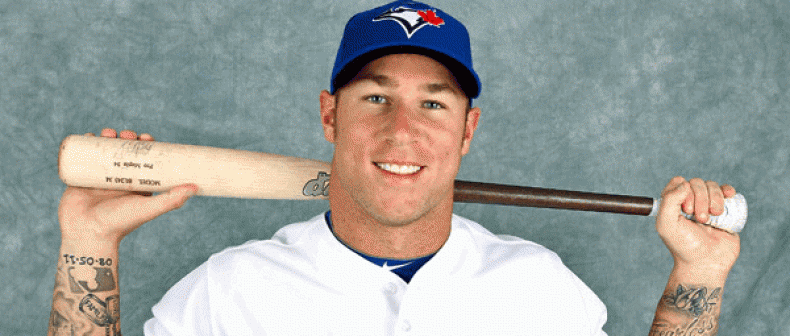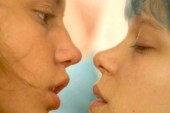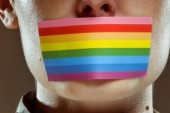
It may not be obvious to the general population that the Toronto Blue Jays have a large, if somewhat closeted, gay following. While the reasons for this homo appreciation of the Jays are somewhat undefined, if there’s one thing that I have learned in my ten or so years as an out gay man, it’s that my people love sexual innuendo. For proof: see mainstay Church Street bar Woody’s (get it?).
It’s fitting then that Blue Jays… or the BJs, if you will, are the most sexually transgressive of Toronto’s major league sports teams.
While lust of major league athletes is often a bi-product of the queer fetishism of jock culture, the fondness for the Blue Jays amongst gay Torontonians goes beyond basic sexual attraction.
Even if my girlfriends go gaga over JP Arencibia’s pearly whites or swoon over JoeyBats’ nude ESPN’s 2012 Body Issue cover, the only Blue Jay that any of my gay friends can name on a regular basis is 3rd baseman #13 Brett Lawrie. This was true even before Brett’s somewhat accidental stint as citizen journalist during the tragic Eaton Centre shooting back in June.
Probably unknowingly, and most definitely unwittingly, the tattoo-sleeved, straight, 22 year-old from Langley BC may become the very first professional-athlete-slash-gay-icon that this town has ever had.
Gay icons are public figures like Madonna, Lady Gaga, and now President Obama who have been openly embraced by the LGBT community often because of their support for queer rights. Metrosexual athletes like David Beckham and Christiano Ronaldo cultivated strong gay fan bases by marrying sport with fashion before they became incidental queer allies. And while such queer affection for straight allies is often tied to the support of gay rights, sometimes, as is the case with Lawrie, a gay icon can be made and not born.
Lawrie’s status as a burgeoning gay icon is at first fairly obvious to comprehend. A quick Google image search turns up various photos of him shirtless; his six-pack and forearms have probably caused more teenage dreams than a Katy Perry song. At its most derivative, Lawrie has become a gay icon simply because he’s the great white hope for many a lustful lad. A boy can dream, right?
Beyond Lawrie’s dimples, however, are some very tangible reasons for his emergent queer popularity. His personality has in fact solidified his position as the Cyndi Lauper of the Rogers Centre.
In fact, Lawrie is a lot like many of his gay fans: he’s a misunderstood misfit.
Lawrie is best known for his on field outbursts, and downright passion for the game. At the best of times this works to his advantage; and in the worst of times, like the May 15th game where he threw his batting helmet at the ground causing it to hit an umpire, it doesn’t. After being handed a four game suspension for said behavior, Lawrie declared, “I’m just playing the game the way I’ve always played it. That’s the passion I have for the game and I don’t feel like I need to change anything.”
And truthfully what gay couldn’t identify with that? In Lady Gaga terms: Lawrie was born this way.
There is, of course, something amusing about the fact that Lawrie is an unwitting gay icon. I’m pretty sure that when he tweeted, “Dorthy [sic] said it best, there’s no place like home” he didn’t realize that the term “friend of Dorothy” would have immediate connotations to his multitude of gay fans.
And while Lawrie’s position as Church Street’s favourite 3rd baseman may be unintentional, his support is rock hard. My friend Mitchell admitted that he noticed Lawrie only because of the helmet throwing incident which he thought was “pretty badass.” Not really a baseball fan, Mitchell started following him on Twitter hoping “he’d start uploading shirtless pictures.” It hasn’t happened… yet.
On OutSports, the largest website catering to LGBT sports fans, which cofounder Jim Businski describes as “The ESPN of gay sports,” Lawrie gets more than his fair share of airtime in “Hot Jock Talk,” an on-site forum where readers can: “Indulge in [their] taste for eye candy.” While some of the comments aren’t exactly family-friendly, Mr. Lawrie is the only Blue Jay that makes an appearance in OutSports’ “Sexiest Baseball Players” thread.
Lawrie was also the only baseball player to make it onto this year’s King of the Hardwood, a tongue-in-cheek ‘March Madness-like’ competition run by an OutSports contributor. The King of the Hardwood awards its titular prize to the hottest male athlete as voted for by readers. Seeded second Lawrie made it to the Sweet 16 before being ousted by a rugby player.
But fondness for Brett amongst the gays goes beyond the superficial. John Hunking, President of Toronto’s Largest Gay Softball League, The Cabbagetown Group Softball League (CGSL), had this to say about Brett’s fan-base: “We all love him not just because he’s hot. But because he’s an awesome baseball player, Canadian, and, more importantly, he loves the game.”
Competitions like the King of the Hardwood and the Hot Jock Talk forum are part of the constant tug of war that exists between gay sports fans who can appreciate both the sexual attractiveness as well as the athletic prowess of their sporting idols.
As Hunking jokingly noted, “I kinda don’t want to bring up Lawrie —I’ll start to salivate.” Before seriously adding: “I think a lot of us in the CGSLreally worship his craft; our appreciation stems from the fact that we also want to be recognized as athletes as well.”
Hudson Taylor, a straight college wrestler in the United States and the founder of Athlete Ally, an organization which aims to challenge homophobia in sports, acknowledges this dichotomy and admits that objectification can sometimes act as a barrier to more athletes becoming allies for the queer community. “But it’s also empowering,” he noted, “when you realize you have thousands of gay Twitter followers who are really supportive of what you’re doing.”
“Gay men are still men” Businski tells me, “Of course we’re going to look at and appreciate the physical nature of players. Why do you think Sports Illustrated does a swimsuit issue or ESPN does a list of hottest athletes every year? But I’m not sure this appreciation of the physical is really sexual.” OutSports itself has been remarkably successful by catering to an audience that actually watches sports, “We’re fairly serious in our reporting; we try not to cover things in a superficial way,” Businski notes, “And truthfully, I don’t know of a single gay or straight person who chooses to spend their Sunday’s watching football simply trying to get a glimpse of a player they find attractive.”
Toronto’s queer community’s appreciation of Lawrie is on the bleeding edge of an as-yet-undefined relationship that athletes, team owners, and gay sports fans are just starting to navigate. Hopefully this undefined relationship will have greater repercussions in one of the few places where homophobia continues to persist: the locker room. It’s become almost a cliché that there has not been an actively-playing out gay athlete in any of North America’s major professional sporting leagues. While professional gay athletes like John Amaechi, who played for the Miami Heat, and, more recently, NFL’er Wade Davis, have come out after ending their sports careers, gay sports fans in Canada and the United States are still waiting for the queer Jackie Robinson.
Both Businski and Taylor acknowledge that straight allies are integral to reducing homophobic culture in sports, “A professional athlete won’t come out until there is a critical mass of support amongst other athletes,” Taylor believes. “There’s a level of support that’s needed and that straight allies can provide.”
Ben Cohen, a former rugby player, who has devoted his post-sporting life to starting the world’s first anti-bullying foundation: The Stand-Up Foundation, has become the prototypical straight ally. But Cohen is an anomaly who played a sport that is nowhere near as popular in North America as baseball or hockey is. “What we’re seeing at the professional level,” Taylor noted, “is that for a large number of athletes, gay players are becoming a non-issue on a personal basis; rather, they’re afraid to speak out because they are told by people above them that it’s not in their best interest.”
This may be changing. OutSports recently interviewed 12 NFL players who told Businki that they wouldn’t care if there was a gay member on their team. Businski’s take away was that a lot of professional athletes are more than welcoming to gay fans and even players… they’re just rarely asked explicitly about the issue. Similarly, “A lot of college athletes,” Taylor told me, “want to help, but don’t really know what to do or how to be supportive.”
It is therefore on an individual basis that athletes are increasingly willing to engage with their gay fans. In 2011, King of the Hardwood runner-up Nick Youngquest took to Twitter to actively solicit votes, and eventual winner, NFL player Eric Decker, did too.
Beyond engagement, athletes are, on an individual basis, starting to go to bat for gay rights too. This is important in the United States, where gay marriage continues to be a socio-cultural flashpoint. In fact the summer of 2012 may have marked a watershed moment in terms of professional athletes crossing the Rubicon in increasingly extreme and vocal support for LGBT fans and their rights.
Witness what happened when Maryland politician Emmett C. Burns Jr asked Baltimore Raven owner Steve Bisciotti to censure linebacker Brendon Ayanbadejo for his support of a marriage equality proposal in Maryland. While Bisciotti backed his player, the most charming surprise came from another NFL player Chris Kluwe, a punter with Minnesota Vikings, who took to sports blog Deadspin, to publish a rather colourful rebuttal, containing the now infamous line: “gay people getting married won’t magically turn you into a lustful cockmonster.”
Back in Canada, arguably one of the most queer-friendly nations, there is some reticence between queer fans, players and owners. When Vancouver Canuck Manny Malhotra marched this August in the Vancouver Pride Parade along with Brian Burke and the You Can Play Team, he became the first major league athlete in Canada to march in a Pride Parade.
While Toronto-based corporations like TD Bank have recently made an It Gets Better video, the Blue Jays, Maple Leafs, and Raptors have not. Even as several MLB cities continue to hold “Pride Nights,” specifically selling tickets to gay fans while raising money for local LGBT charities, the Blue Jays haven’t hosted one since 2009.
When I asked Hunking about the CGSL’s relationship with the Jays, he admitted that, while the Jays were supportive, there were few ties between the two organizations beyond the Jays sending some gift packages for CGSL events.
The obvious reason for this lack of relationship is that, in Canada, gay rights have presumably moved so far into the mainstream we don’t need anyone to pull a Kluwe. The belief is that battle for LGBT rights has already been successfully fought and won. And while this may be true in many arenas, athletics remains a bastion of heteronormativity– even in Canada. There has never been an openly gay professional athlete in Canada and of the 23 openly gay athletes at the London Olympics, none were Canadian.
As in the United States, it may be up to athletes then to pull their bosses out of the dark ages and, while Brett Lawrie may not realize it, he has the city’s gay population wrapped around his proverbial bat. And as a straight, almost gay icon, Lawrie has the chance to be part of be one of the straight allies that are necessary if we are ever going to destroy one of the last vestiges of homophobia: the locker room.
One day, I know that gay Blue Jays fans will be able to cheer for one of our own. And beyond that day, I hope that gay baseball players will become so common we’ll all yawn in boredom over a hometown appearance at Woody’s. But until that time comes, gay sports fans will have straight, gay-friendly, icons to look up to. And while gay Jays fans may not have our own Friend of Dorothy, hopefully we can find a friend in Lawrie.
____
Jonathan Naymark is a Toronto-based writer whose work has also appeared in The Grid, Metro, and Huffington Post Canada, among other publications. Follow him on Twitter @Naymark.
For more, follow us on Twitter @TorontoStandard and subscribe to our newsletter.














